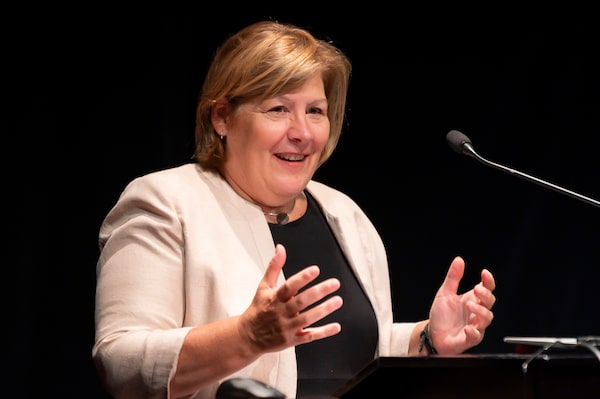
Justice Marie-Josée Hogue on August 22, 2023 in an image from Université de Sherbrooke.Université de Sherbrooke
Justice Marie-Josée Hogue says a federal inquiry into foreign interference in Canadian democracy is now under way and she is promising to make available as much information as possible so the public can understand the scope and seriousness of the problem.
Justice Hogue released a statement Thursday, saying she has been busy hiring staff and setting up her office since the government announced on Sept. 18 that she would head the inquiry into foreign interference.
She will examine the role that China, Russia and other hostile states played in trying to influence the outcome of the 2019 and 2021 elections. Justice Hogue will also look at the flow of foreign-interference assessments to senior government decision-makers, including elected officials, during the election periods.
It is expected that inquiry hearings will take place early next year and in the fall. The inquiry’s first report is due by Feb. 29, 2024.
In the second phase, the inquiry will examine the capacity of federal departments and agencies to detect and counter foreign interference by hostile states such as China and Russia.
The final report is due by Dec. 31, 2024, and will make recommendations on how to better protect Canada’s democratic processes from foreign interference. The next federal election is scheduled for the fall of 2025, but a campaign could take place before then if the New Democratic Party were to withdraw its support from a pact with the Liberal government.
“Our timeline is ambitious, and it will require the inquiry and all interested parties to work expeditiously and co-operatively with one another. I look forward to working with all of those involved,” Justice Hogue said.
The inquiry expects to issue a call for applications for standing by interested parties on Nov. 10, when it launches its website. Funding may be available for parties that meet approved guidelines, Justice Hogue said.
The public inquiry was established after months of reporting on Chinese foreign interference, including revelations in The Globe and Mail on May 1 that Beijing targeted Conservative foreign affairs critic Michael Chong and his relatives in Hong Kong in the lead-up to the 2021 election.
The disclosure of this meddling prompted Ottawa to expel Chinese diplomat Zhao Wei later that month.
The Globe produced more than 15 stories based on national-security sources and secret Canadian Security Intelligence Service (CSIS) documents, including a February story relying on CSIS intelligence reports that described a concerted strategy by Beijing to disrupt the democratic process in the 2021 election.
The governing Liberals this spring initially resisted launching a public inquiry despite three votes calling for one in the House of Commons by opposition parties, who hold the majority of seats.
Instead, Prime Minister Justin Trudeau tapped former governor-general David Johnston to investigate Chinese government interference in the 2019 and 2021 election campaigns. Mr. Johnston’s report, which concluded that there was no need for a public inquiry, was widely criticized and denounced by the three main opposition parties.
Mr. Johnston abruptly announced his resignation in June, citing a “highly partisan atmosphere.”
Justice Hogue is likely to look at recent reports on foreign interference, such as one from the Commons standing committee on access to information, privacy and ethics. The committee recently tabled a report that urged the government to direct CSIS to share information with the public regularly “in order to increase national security literacy.”
The report also called on Ottawa to add Criminal Code penalties that cover “all foreign interference operations, including harassment and intimidation by a foreign state.” It asks the government to ensure that these new penalties “provide appropriate sanctions.”
Canada does not currently have Criminal Code offences that explicitly and comprehensively address the full range of clandestine methods used to conduct foreign interference.
The committee also asked the government to quickly act on its pledge to bring in a foreign-influence registry, which would require people employed on behalf of foreign governments or interests to disclose information about their work. Similar registries are in effect in the United States and Australia, and Britain is currently setting one up.
 Robert Fife
Robert Fife Steven Chase
Steven Chase